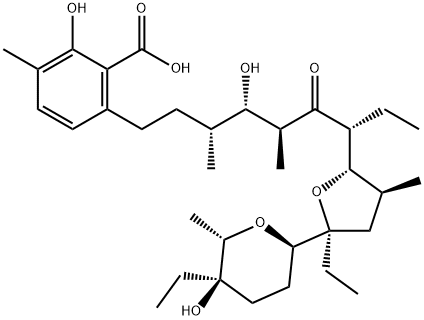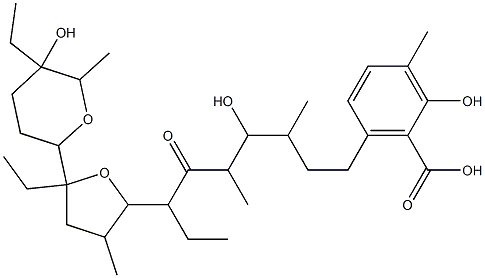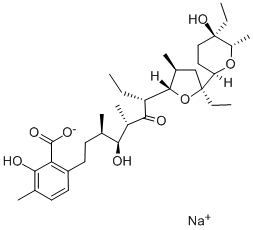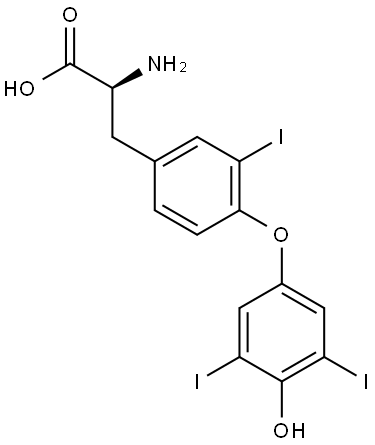Lasalocid
- CAS NO.:25999-31-9
- Empirical Formula: C34H54O8
- Molecular Weight: 590.79
- MDL number: MFCD00242774
- EINECS: 247-401-9
- SAFETY DATA SHEET (SDS)
- Update Date: 2024-11-19 23:02:33

What is Lasalocid?
Description
Lasalocid is an ionophore antibiotic isolated from certain Streptomyces sp. and used in veterinary practice as a coccidiostat for gastrointestinal parasites. Lasalocid cytotoxicity targets cell metabolism, demonstrating EC50 values in the range of 7-
The Uses of Lasalocid
Lasalocid is a polyether ionophore with potent antibacterial activity isolated from Streptomyces lasaliensis, first reported in 1951. Lasalocid was developed as an animal health product for treatment of coccidia. Lasalocid is able to form neutral complexes with monovalent and divalent cations and transport the ions through apolar phase (including lipid bilayer membranes). Interestingly, lasalocid can also transport larger organic cations, e.g. protonated dopamine.
The Uses of Lasalocid
Lasalocid is an anticancer supplement agent comprising of polyether antibiotic for treating brain tumors, also inhibits mitochondrial GPD2 activity and elicits anti-proliferative effects on cancer cells.
What are the applications of Application
Lasalocid is an ionophore antibiotic isolated from certain Streptomyces sp.
Definition
ChEBI: Lasalocid is a polyether antibiotic used for prevention and treatment of coccidiosis in poultry. It has a role as a coccidiostat, a bacterial metabolite and an ionophore. It is a monohydroxybenzoic acid, a beta-hydroxy ketone, a secondary alcohol, a member of oxolanes, a monocarboxylic acid, a member of oxanes, a tertiary alcohol and a polyether antibiotic. It is a conjugate acid of a lasalocid(1-).
brand name
Avatec [as sodium] [Veterinary] (Hoffmann-LaRoche); Bovatec [as sodium] [Veterinary] (Hoffmann-LaRoche).
General Description
Lasalocid is one of the polyether ionophore antibiotics and was found in the culture broth of Streptomyces lasaliensis by Hoffmann-La Roche in 195. It shows activity against gram-positive bacteria, including Mycobacterium and Streptomyces, and also against anaerobic bacteria, but it has no activity against gramnegative bacteria or fungi. Lasalocid also shows strong anticoccidial activity, and it stimulates propionic acid formation in the rumen. It is used for prophylaxis and for therapy of coccidial infections in poultry and as a feed additive for growth promotion in cattle.
in vitro
a previous study was conducted to compare effects of the combined use of lasalocid and silybin in chicken hepatoma cells and rat myoblasts cell lines cultures. results showed that in all performed tests, the lowest lasalocid ec50-values were obtained for chicken hepatocytes. in the rat myoblasts cultures, the lowest lasalocid ec50-values were found. moreover, a lack of silybin cytotoxic effect was proven for the studied cell lines. an interaction between both substances resulted in a great decrease of lasalocid cytotoxicity. the isobolograms and combination index indicated a significant antagonistic nature of silybin effect in the course of lasalocid cytotoxicity [1].
in vivo
in a animal study, chickens 8 or 9 days old were given a completely purified crystalline amino acid diet. results showed that the requirement for sulphur-containing amino acids (saa) was neither increased nor decreased by lasalocid at 125 mg/kg diet. moreover, lasalocid could cause a significant increase in gain and gain/feed intake when added to diets that were deficient in saa, but it led to a marked decrease in performance when added to diets adequate in saa. in addition, at moderate levels of saa deficiency, lasalocid at 125 mg/kg could neither increase nor decrease the rate and efficiency of weight gain and there was no evidence of the saa x lasalocid interaction when lasalocid was given in a typical starter diet of maize and soya [2].
References
[1] radko, l. ,cybulski, w., and rzeski, w. the protective effect of silybin against lasalocid cytotoxic exposure on chicken and rat cell lines. biomed.res.int. 2013, 1-8 (2013).
[2] willis gm, baker dh. lasalocid-sulfur amino acid interrelationship in the chick. poult sci. 1980 nov;59(11):2538-43.
Properties of Lasalocid
| Melting point: | 110-114°; mp 100-109° (unsharp) |
| Boiling point: | 735.7±60.0 °C(Predicted) |
| alpha | D25 -7.55° (methanol) |
| Density | 1.119±0.06 g/cm3(Predicted) |
| storage temp. | -20°C Freezer, Under inert atmosphere |
| solubility | Acetonitrile,(Slightly), Methanol (Slightly, Sonicated) |
| form | Solid |
| pka | 3.15±0.39(Predicted) |
| color | White to Off-White |
Safety information for Lasalocid
Computed Descriptors for Lasalocid
New Products
4-AMINO-TETRAHYDRO-PYRAN-4-CARBOXYLIC ACID HCL 4-(Dimethylamino)tetrahydro-2H-pyran-4-carbonitrile 4-AMINO-TETRAHYDRO-PYRAN-4-CARBOXYLIC ACID 4-Aminotetrahydropyran-4-carbonitrile Hydrochloride (R)-3-Aminobutanenitrile Hydrochloride 5-Bromo-2-nitropyridine Nimesulide BP Aceclofenac IP/BP/EP Diclofenac Sodium IP/BP/EP/USP Mefenamic Acid IP/BP/EP/USP Ornidazole IP Diclofenac Potassium 3-Bromopyrazole (3aR,4R,5R,6aS)-hexahydro-5-Triethyl silyloxy-4-((E)-3-oxo-5-phenylpent-1- enyl)cyclopenta[b]furan-2-one. 1-Chlorocarbonyl-4-piperidinopiperidine 1-Bromo-4-phenyl-2-Butanone 4-Amino-2-fluoro-N-methylbenzamide 1,1'-Carbonyldiimidazole SODIUM AAS SOLUTION ZINC AAS SOLUTION BUFFER SOLUTION PH 10.0(BORATE) GOOCH CRUCIBLE SINTERED AQUANIL 5 BERYLLIUM AAS SOLUTIONRelated products of tetrahydrofuran








You may like
-
![Dimethyl [2-oxo-3-[3-(trifluoromethyl)phenoxy]propyl]phosphonate 99%](https://img.chemicalbook.in//Content/image/CP5.jpg) Dimethyl [2-oxo-3-[3-(trifluoromethyl)phenoxy]propyl]phosphonate 99%View Details
Dimethyl [2-oxo-3-[3-(trifluoromethyl)phenoxy]propyl]phosphonate 99%View Details
54094-19-8 -
 85-81-4 99%View Details
85-81-4 99%View Details
85-81-4 -
 Cyclopentane carboxxylic acid 3400-45-1 99%View Details
Cyclopentane carboxxylic acid 3400-45-1 99%View Details
3400-45-1 -
![208111-98-2 (3aR,4R,5R,6aS)-5-(Benzoyloxy)hexahydro-4-[(1E)-3-oxo-4-[3-(trifluoromethyl)phenoxy]-1-buten- 1-yl]-2H-cyclopenta[b]furan-2-one 99%](https://img.chemicalbook.in//Content/image/CP5.jpg) 208111-98-2 (3aR,4R,5R,6aS)-5-(Benzoyloxy)hexahydro-4-[(1E)-3-oxo-4-[3-(trifluoromethyl)phenoxy]-1-buten- 1-yl]-2H-cyclopenta[b]furan-2-one 99%View Details
208111-98-2 (3aR,4R,5R,6aS)-5-(Benzoyloxy)hexahydro-4-[(1E)-3-oxo-4-[3-(trifluoromethyl)phenoxy]-1-buten- 1-yl]-2H-cyclopenta[b]furan-2-one 99%View Details
208111-98-2 -
 2033-24-1 99%View Details
2033-24-1 99%View Details
2033-24-1 -
 Meldrums acid 2033-24-1 99%View Details
Meldrums acid 2033-24-1 99%View Details
2033-24-1 -
 Cyaclopentane carboxylic acid 99%View Details
Cyaclopentane carboxylic acid 99%View Details
3400-45-1 -
 2-Aminopyridine 504-29-0 99%View Details
2-Aminopyridine 504-29-0 99%View Details
504-29-0